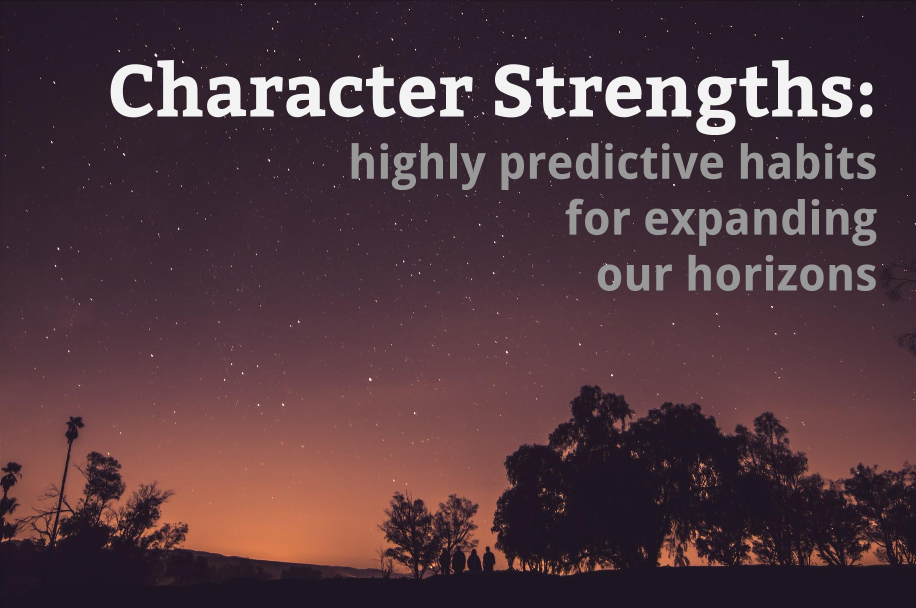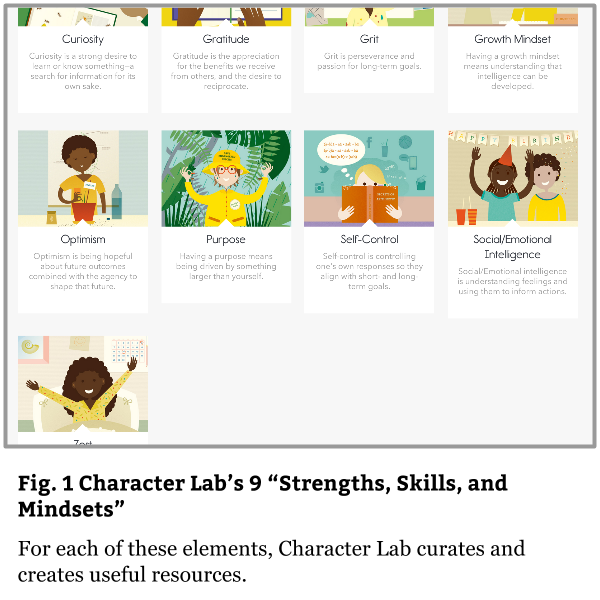A Note from Dave: My approach to character development in class has shifted since I wrote this page. You can read all about it in Chapter 2 of These 6 Things. For a very helpful page on character strengths, I recommend this one.

Literacy is non-negotiable for students on the path to a flourishing life.
Yet it's not everything.
Let's do a quick exercise
Picture a kid you currently work with who you feel is most likely to succeed. You don't need to have a rational reason — just a gut feeling will work.
Got the kid in your head? Good.
Now: why did you pick that kid? Describe what it is about the kid that makes you think she'll succeed. Go ahead. Talk to the computer. I'm listening.
Thank you.
Here's how most people don't answer that question
Most folks don't pick their kid because the kid is smart; they definitely don' t pick the kid because he's good at taking tests.
No. Most folks say things like:
- eager to learn
- friendly
- resilient
- determined
- organized
- self-starting
And so on.
Intelligence is a big deal — but character is too.
I sort of hate Sputnik.

My problem with Sputnik is that, when the USSR ignited the space race by launching Sputnik into the sky, it provided a fear-based incentive for educational reforms that would improve the United States' academic achievement. Sputnik-inspired reforms aimed mostly at science and technical education, but it wasn't long before “the three R's” landed firmly in US edu-policy crosshairs.
Today, the USA is a country whose schools are firmly betting that academics alone will yield American competitiveness; Paul Tough calls this flawed conventional wisdom the “cognitive theory.”
And yet a growing body of research is showing what we all know to be the case: success isn't solely a function of how good we measure on the state math test or how well we score on the ACT Reading or how high our IQ is. These measures of cognitive ability are not worthless; wise teachers value them for what they are. Yet they are not infallible, either. The great teachers around this country aim at smarts + more.
The promise of the research and the problem with the term
So what are those non-academic skills that so often make people of average intelligence end up more successful in life than people of above-average intelligence?
A lot of focused work has been done around this question over the past few years. Nobel Prize-winning economists, MacArther Grant-winning researchers, college-and-career-readiness experts, determined parents, and everyday teachers like you and me are earnestly in search of the most highly predictive character strengths (or, as James Heckman, the Nobel-winner, calls them, “noncognitive skills“; or, as David Conley, the readiness experts, calls them, “success skills”).
The good news is that we now know a lot about what these strengths are.
“Highly predictive” character strengths
A powerful collaboration of Dr. Martin Seligman (University of Pennsylvania), Dr. Chris Peterson (University of Michigan — Go Blue!), Dr. Angela Duckworth (University of Pennsylvania), KIPP co-founder Dave Levin, and CharacterLab board member Dominic Randolph have developed a focused list of seven character strengths that are highly predictive of lives that are “engaged, meaningful, and purposeful.”
You can click on the image above to see what Character Lab has to say about each of the strengths — they have become my go-to resource for all things character strengths.
For the rest of this page, I'm going to keep track of everything I know and have read about character strengths instruction. If you know of something — an article, a study, a video — I've missed, or if you find I've made a mistake somewhere on the page, please contact me here.
he research supporting them is equally cool. For example, Dr. Duckworth gave a simple, 10-question survey about grit–perseverance, essentially–to incoming freshman cadets at West Point. After a period of time, Duckworth's simple survey ended up being more predictive of success than the highly sophisticated measurement tools West Point has traditionally used.
Getting started with character strengths:
The first step to doing these right in the classroom is understanding both what they are and the research behind them. The best way to do that is through a couple of videos made by leaders in the work.
Angela Duckworth's second TED talk on the topic
Just for the record, I have a hard time being unbiased about Dr. Duckworth. Her ethos/pathos/logos combination zeroes in on my head and my heart, and it's had a shaping effect on my work since I first became acquainted with it back in 2011.
This video is a short and powerful entre into the topic of grit in particular and character strengths in general:
Angela Duckworth's first TED talk on the topic
Duckworth's first TED talk is longer; it provides different anecdotes and studies.
Andrew Sokatch — Director of Research at Character Lab
Andy is an able communicator, a sharp mind, and a great leader. His TED talk is great.
Going deeper:
- “An emerging theory about what to teach kids” — an engaging episode of This American Life, in which Paul Tough, James Heckman, and others lay out the growing case for infusing soft skills into curricula
- Smart Strengths — a descriptive approach to strengths in the schools (I do not use this approach but respect it)
- “What if the Secret to Success is Failure?” — this is the article that introduced me to the compelling and simple list of 8 highly predictive character strengths.
- OneGoal, an innovative college persistence program working to make college graduation possible for all students.
- “Struggle for Smarts? How Eastern and Western Cultures Tackle Learning” — Americans tend to see struggle as a sign of low ability. Asian cultures see it as an opportunity
- The VIA list of character strengths — including but not limited to the highly predictive ones pictured above.
